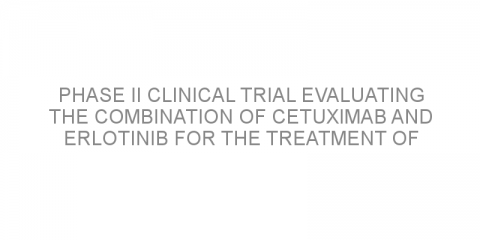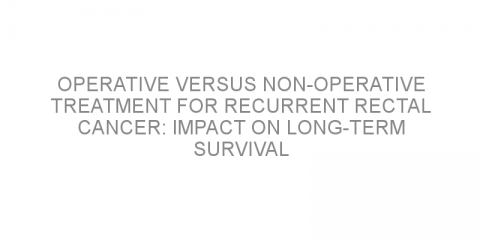In a nutshell This study investigated the effects of bevacizumab (avastin) in combination with chemotherapy on the risk of cardiac related events, such as heart failure and cardiac related death. Some background Bevacizumab is a drug which targets a protein called vascular endothelial growth factor A (VEGF-A). By binding to VEGF-A...
Read MoreConfined or spread disease-Spread into the peritoneum Posts on Medivizor
Evaluating the safety and efficacy of adding bevacizumab in two capecitabine-based chemotherapy regimens for the treatment of patients with metastatic colorectal cancer
In a nutshell This phase II clinical trial investigated the addition of bevacizumab to two chemotherapy regimens for the first line treatment of patients with metastatic colorectal cancer (CRC). Some background Cancer cells need blood supply in order to grow. They do so by forming new blood vessels, thus feeding themselves. Bevacizumab (Avastin)...
Read MoreIntermittent versus continuous chemotherapy in advanced colorectal cancer
In a nutshell The aim of this study was to assess the effects of pauses during chemotherapy in patients with advanced colorectal cancer (CRC). Some background In advanced CRC (cancer of the large bowel that has spread to the lymph nodes and other tissues and organs of the body) the cancer is more difficult to remove. Patients usually need...
Read MoreEvaluating the benefits of laparoscopy in determining the extent of peritoneal carcinomatosis for patients with colorectal cancer
In a nutshell This article evaluated whether the use of a minimally invasive diagnostic technique called laparoscopy before surgery to treat peritoneal carcinomatosis improves the selection of patients who can benefit the most from treatment. The authors of the study found that laparoscopy can be used to select patients for whom surgery may be a...
Read MoreEarly post-operative intraperitoneal chemotherapy (EPIC) and hyperthermic intraperitoneal chemotherapy (HIPEC) after cytoreductive surgery (CRS) for cancers of the appendix, colon or rectum
In a nutshell This study will compare two procedures to deliver chemotherapy into the abdominal cavity following surgery to remove colorectal cancer spread to the peritoneum (the lining of the abdominal cavity). The primary outcome of the study is disease-free survival, or the length of time without any evidence of cancer. The details...
Read MoreDefining patients with a high risk of developing peritoneal carcinomatosis after curative surgery
In a nutshell The objective of this study was to identify risk factors predictive for developing peritoneal carcinomatosis (PC) after curative surgery for colorectal cancer (CRC). The data show three situations that could result in a real risk of recurrent PC: synchronous PC, synchronous isolated ovarian metastases and a perforated primary tumor. There...
Read MorePhase II clinical trial evaluating the combination of cetuximab and erlotinib for the treatment of patients with metastatic colorectal cancer
In a nutshell This article presents the results of a phase II clinical trial that evaluated the efficacy and safety of the combination of two targeted therapies – cetuximab and erlotinib – for patients with metastatic colorectal cancer (mCRC). Some background Colorectal cancer that has spread outside the large...
Read MoreXELIRI-bevacizumab versus FOLFIRI-bevacizumab as primary treatment for patients with metastatic colorectal cancer
In a nutshell The present clinical trial compared two chemotherapy regimens as first-line treatment for patients with metastatic colorectal cancer (mCRC): XELIRI-bevacizumav versus FOLFIRI-bevacizumab. Some background Approximately one quarter of patients with colorectal cancer (cancer in the large intestine) have metastases,...
Read MoreOperative versus non-operative treatment for recurrent rectal cancer: impact on long-term survival
In a nutshell The present paper compares long-term survival rates of surgery versus non-operative treatments in patients with recurrent rectal cancer (RRC). Some background Rectal cancer is cancer in the final section of the large intestine, or rectum. Surgery to remove the cancer is the first choice of treatment, but chemotherapy with or...
Read MorePhase I trial to determine the safety of a new anti-cancer drug: PD 0332991
In a nutshell This article presents the results from the first human trial of PD 0332991, a new anti-cancer drug. The main objective of the study was to determine the safety and recommended dose for further testing. Results warrant further studies and revealed that neutropenia (low white cell count) was the main side effect. Some background Cells...
Read MoreEvaluating the risks and benefits of treatment for abdominal cancer spread
In a nutshell The present study evaluated the long-term quality of life (QOL) for patients with peritoneal carcinomatosis (PC) who had cytoreductive surgery (CRS) and HIPEC (hyperthermic perioperative chemotherapy). Main findings: patients who survived the procedure regained their baseline (pre-operative) QOL within 6-12 months after...
Read MoreComparison of two surgical techniques for the treatment of pseudomyxoma peritonei
In a nutshell The present study compared the efficacy of two surgical techniques to treat pseudomyxoma peritonei (PMP): debulking and cytoreduction. Cytoreductive surgery achieved better surgical results and yielded higher 3- and 5-year survival rates, compared with debulking. Some background PMP is a rare condition caused by the production of...
Read More












